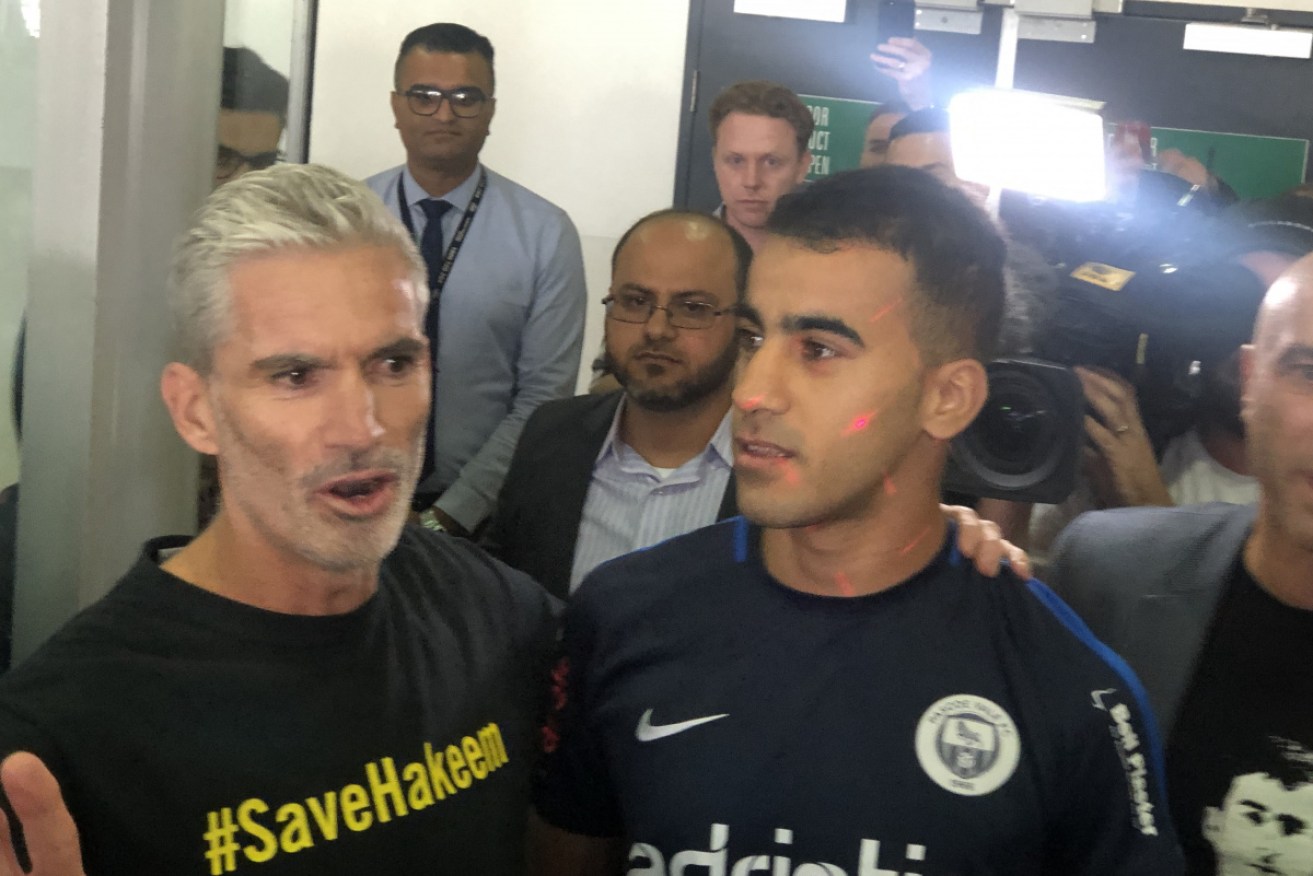Australian ‘miscommunication’ caused al-Araibi’s arrest

Peter Dutton's department has admitted Australia was responsible for al-Araibi's detention. Photo: Francis Leach/TND
The arrest in Thailand of refugee footballer Hakeem al-Araibi was the direct result of a “miscommunication” between two agencies in Peter Dutton’s portfolio.
The New Daily has confirmed the failure to raise al-Araibi’s protected status as a refugee before the Interpol red notice was issued was the result of a miscommunication between Australian Federal Police and Australian Border Force.
The Home Affairs Department is preparing to launch an urgent review into the automatic notification system this week, which led to the Melbourne-based footballer being the subject of an Interpol red notice and arrested in Thailand before spending months behind bars.
Under Interpol’s refugee policy, a red notice cannot be issued against a refugee from the country they initially fled.
Arriving back in Melbourne on Tuesday, al-Araibi said he wanted to thank the people of Australia for campaigning for his release.
“I don’t have citizenship yet, but my country is Australia. I will die in Australia and I love Australia,” he said.
But serious questions remain over how he came to be arrested.
On Tuesday, Mr Dutton said AFP Commissioner Andrew Colvin would have “something more to say” about the matter soon.
“Whether or not there are issues around the AFP, I think the AFP commissioner will have something to say on that in due course,” Mr Dutton told reporters in Canberra.
“We’ll have a look at that aspect of it.”
But after several hours the AFP kicked responsibility back to the department saying “we understand there is a portfolio response in the works,” a spokesman said.
Ex-Socceroo Craig Foster said while he was grateful for the tireless work of Foreign Affairs Minister Marise Payne and Prime Minister Scott Morrison, those responsible for the bungle needed to be held to account.
It is now known that Interpol Australia alerted Thai authorities that al-Araibi was en route to Thailand, but did not warn him that he was the subject of a red notice and could be arrested and returned home to the country he fled after his arrest and torture.
The Department of Home Affairs has previously confirmed that Interpol Australia tipped off the Thai officials before his arrest.
“The Interpol National Central Bureau in Australia advised Thai authorities in relation to the scheduled arrival of a person who was the subject of an Interpol Red Notice,” a spokesman said.
“Any action taken in response to the Interpol Red Notice is a matter for Thai authorities.”
But Australian officials now concede it is a question for bureaucrats at home, with the Morrison government keen to ensure it never happens again.
Al-Araibi fled to Australia while on bail after a 2011 crackdown on dissidents, revealing he was jailed for three months and tortured.
He said guards beat his legs and told him he would never play football again.
Labor and the Greens have also turned their attention to how Bahrain came to issue the Interpol red notice that resulted in him being jailed when he landed in Thailand for what was supposed to be his honeymoon.
Labor has said it will block the Greens bill to establish a Senate inquiry, and instead question the department in Senate estimates next week.
Greens immigration spokesman Nick McKim said he wanted to investigate how the 25-year-old permanent Australian resident was “dobbed in” and faced possible forced return to Bahrain.
The proposed inquiry would also look at the AFP’s actions following al-Araibi’s arrest and the operation of the red notice system.
“We need to understand exactly what role the AFP played in Hakeem being arrested and stranded in a Thai jail for months,” Senator McKim said.
Hakeem is a refugee and a permanent Australian resident. He should never have been put in this situation.”
Labor foreign affairs spokesperson Penny Wong said the opposition would use Senate estimates next week to get answers.
“We do need to consider whether or not the automated Interpol Red Notice system is fit for purpose, particularly when it comes to people who are found to be refugees,” Senator Wong told ABC radio on Tuesday.
Foster, who led a campaign for al-Araibi’s release, on Tuesday called for a thorough investigation into the role of the AFP.
“For many reasons. One is because, as the public, we need to be completely confident that the processes have been followed and, secondly, we need to ensure that the system is going to be changed,” Foster told reporters at Melbourne Airport.
He also called for changes within the governance of sports.
“We think that this was very much about the soul of sport, which has been sold, and money has infiltrated the values of both football and other sports,” Foster said.
“We think that it’s time to start to claim that back, and Hakeem al-Araibi standing here and talking to Australia is a big blow in that regard.
“But also we want to see an investigation into Interpol and the use of red notices itself – not just Australia’s role, which was after the Interpol red notice was placed on him.”
Bahrain wanted al-Araibi extradited to serve a 10-year sentence for vandalism that he denies, saying he was playing a televised soccer match at the time the vandalism was alleged to have occurred during pro-democracy protests.
Australia lobbied Thailand for al-Araibi’s release and on Tuesday commended Thailand for releasing him.








